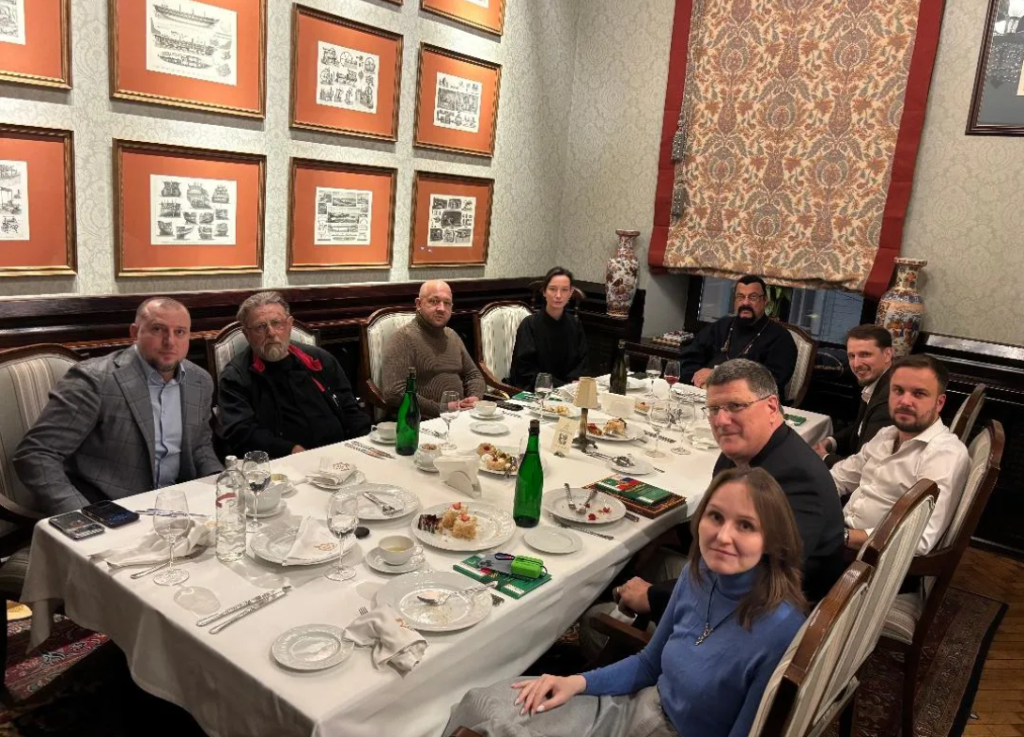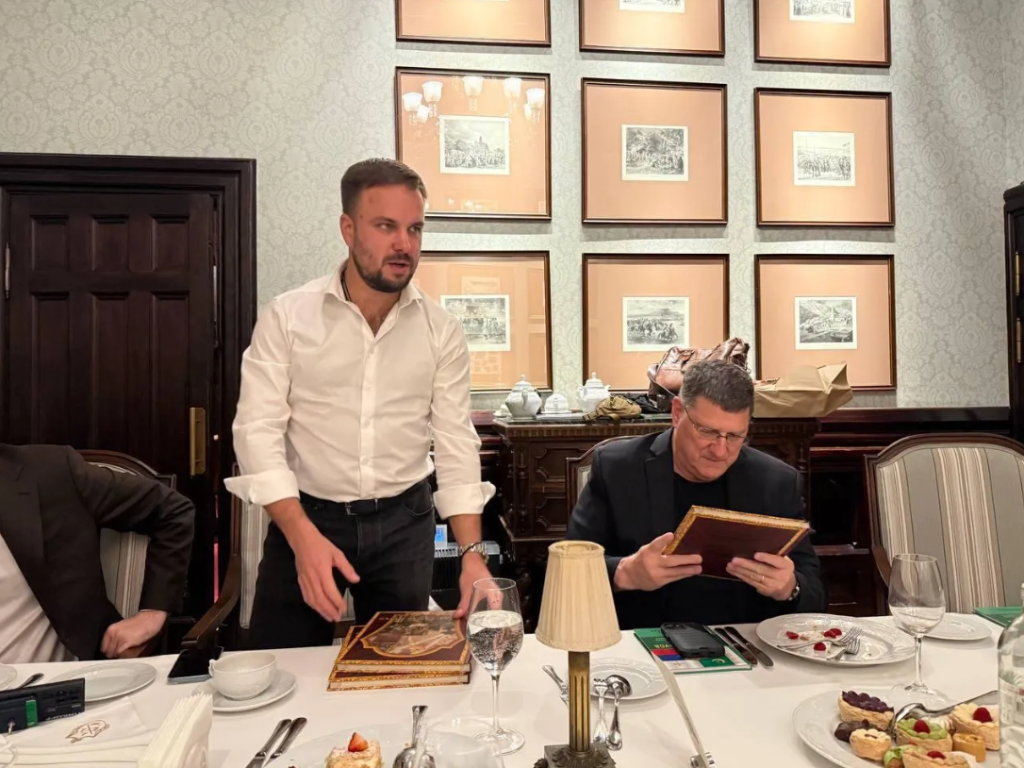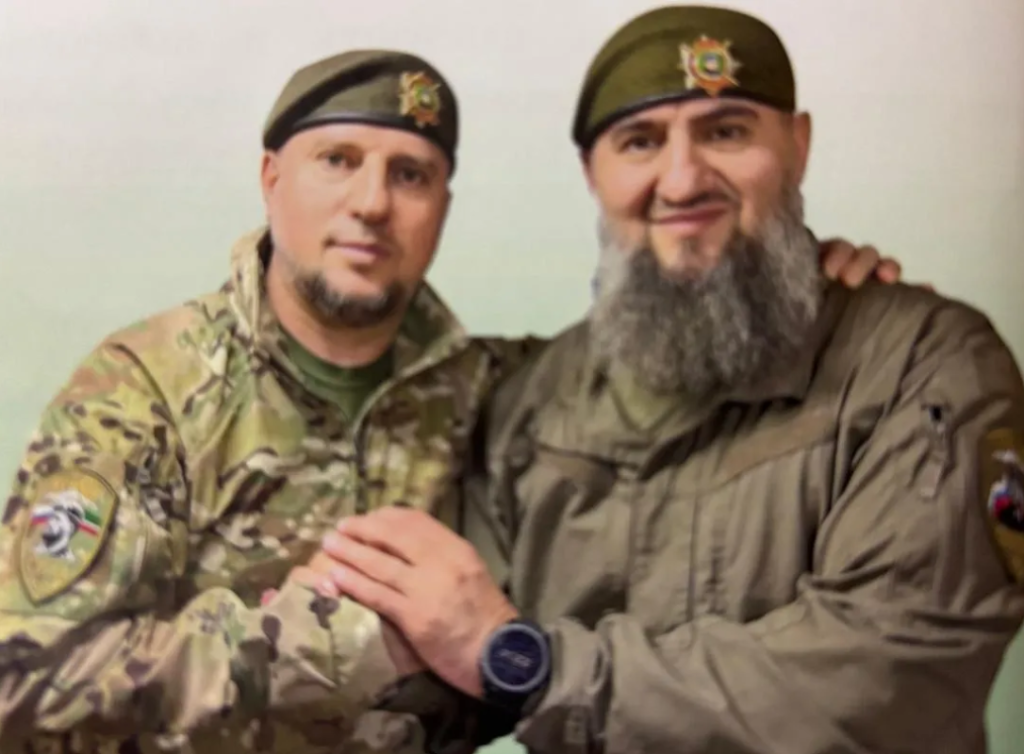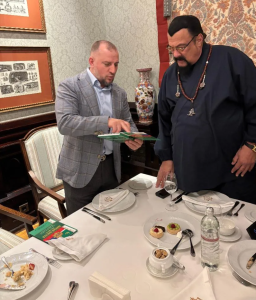Scott Ritter – Dinner at Anton’s Restaurant of the Central House of Writers in Moscow

The ad hoc CDL Discussion Group
by Scott Ritter [10-21-2025] Scott Ritter(bio), Larry C. Johnson(bio).
(RAD: This recap of their 4+ hour discussion is filled with a lot of insights about war and the importance of person-to-person discussions. Apti pointed out the importance of capturing the best fighters of the enemy and treating them well, instead of just killing them in combat. This helps diffuse hatred when they go home to their families and need to rebuild the country. Apti also pointed out how drones have completely changed warfare. There are many different types of drones 24/7 that each specialize in specific objectives. Most of the strategies that Scott Ritter had learned & practiced as a Marine have been taken over by drones. — RAD)
What started out as a simple meeting between a writer and his publisher turned into an unforgivable evening of intellectual discourse among friends and colleagues.
When I accepted the invitation from RT to attend their 20th Anniversary Gala, I had originally intended to arrive on a Thursday, attend the Gala on a Friday, recover on a Saturday, and fly home on a Sunday. After all, I had numerous competing domestic agenda items on my plate, the most critical of which was my daughter Victoria’s upcoming wedding on November 1st. My wife reminded me that we had many things that needed to be finalized before the wedding, and that the calendar was unforgiving. But when an opportunity came for a meeting about a potential documentary film I was interested in making that could only be held on Monday, I suddenly had a Sunday evening free with no scheduled commitments.
I was scheduled to return to Russia in November to launch the Russian language edition of my book, Highway to Hell, and to undertake several interviews and speaking engagements related to the topics of bettering US-Russian relations and renewing bilateral arms control, themes which resonate in my book. My Russian producer/agent, Alexandra Madornaya, had introduced me to the Konseptual publishing house and its director, Konstantin Antipin, during my previous visit in August of this year. We also met with Anton Karpov, the CEO of the Restaurant of the Central House of Writers, or CDL. From these two unrelated events came the idea of conducting a book launch event at the CDL.
I asked Alexandra if she could organize a dinner for Sunday night with Konstantin and Anton, and much to my pleasure Anton was kind enough to book us a table at his restaurant.
Russia being Russia, nothing happens in a vacuum. On Saturday night myself and Larry Johnson, the former CIA officer-turned-podcaster who had also been invited to RT’s 20th Anniversary Gala, had met up with Steven Seagal, the famous action-hero film star who today resides in Russia, where he serves as an ambassador at large for the Russian Foreign Ministry. I had previously met with Mr. Seagal in January 2024, during an earlier visit to Moscow, and had introduced him to the legendary commander of the Akhmat Special Forces unit, Lieutenant General Apti Alaudinov. Mr. Seagal inquired about Apti, and I forwarded his well wishes to Apti, who immediately informed me he was in Moscow and would like to meet. The problem was I was fully booked, and had no free time left on my calendar for such a gathering.

Anton Karpov, the CEO of the Restaurant of the House of Writers (CDL)
Anton had written a book on the Akhmat Special Forces entitled I Remember that Day, a collection of short stories derived from interviews with the officers and soldiers of Akhmat about their experiences during the Special Military Operation. I had read the English language version of Anton’s book and noted that he had interviewed General Alaudinov. I asked Anton if he would mind if Apti joined us. He immediately agreed it was a good idea. I then opted to push my luck and asked if Steven Seagal could also join us, since Apti had expressed an interest in meeting him. Anton graciously agreed. I then thought of my two partners in crime, Judge Andrew Napolitano and Larry Johnson, and hinted to Anton they these two notable Americans would benefit from being in the company of such men.
Anton, as perceptive as ever, readily agreed, and had our party moved into a more spacious, private dining hall.
And that, ladies and gentlemen, is how history is made.
One by one, our additional guests arrived—first Apti, followed by Larry (the Judge was flying out that night and couldn’t make it), and then Mr. Seagal.
It was around 8 pm by the time we convened the entire group: Apti Alaudinov, Steven Seagal, Larry Johnson, Anton Karpov, Roman Mex (Anton’s collaborator on the I Remember that Day book project), Konstantin Antipin, Alexandra Madornaya, myself, and Mr. Seagal’s assistant.
Prior to Apti’s arrival, we had, in keeping with the literary traditions of the establishment we were located in, been discussing the Russian language version of Highway to Hell (the publisher had brought a full-size mockup of the book, which in Russian was known as Doroga v Ad) and the English language version of I Remember that Day (Anton had a similar full-scale mock-up for us to examine.)

Lieutenant General Apti Alaudinov and Imam Magomed Khiitanev
Not to be outdone, Apti had brought along copies of a new book he had co-authored with Magomed Husseinovich Khiitanaev, the senior Imam (Islamic religious authority) of the Akhmat Special Forces, entitled The Army of Jesus (Isa, peace be upon him) in the Battle against the Army of the Dajjal-Antichrist (in the Islamic tradition, Dajjal is a false messiah, like the image of the Antichrist in Christianity.)
This book addresses the issue of ethics in wartime, especially as applied to the fundamental questions of good versus evil that are intertwined throughout the Special Military Operation. Apti joked that he had acquired the nickname “Preacher” because of the religious undertones of his speeches and addresses to frontline fighters and civilian supporters. Apti noted that the flag of the Akhmat Special Forces, which adorned the cover of his book, bore the symbology of both Islam (the crescent moon a star) and Christianity (the Russian Orthodox Cross), symbolizing the religious diversity of the Russian Federation and the fact that while his unit was named after the founding father of the modern Chechen Republic, Akhmat Khadirov, it was very much a reflection of the modern Russian reality, comprised of soldiers from every corner of Russia who fought for the glory of Russia and the Glory of the one God shared by both the Muslim and Christian faiths.
Apti then graciously presented each of us in attendance with a signed copy of his book. Following the presentation ceremonies, the conversation turned to the themes discussed in the book. Here Apti and Steven Seagal engaged in a very enlightening exchange about the morality of combat and the ethos of the combatant. Steven’s extensive experience in martial arts, combined with his real-world experiences in law enforcement, readily juxtaposed with Apti’s history as a warrior over the past 30-plus years. How to control the natural proclivity for revenge-fueled blood lust was a question we all wrestled with in an open and telling round table exchange, before Apti capped the discussion by stating that, in his experience, it was better to preserve the lives of your most skilled and dangerous opponents than take them. A good warrior—an ethical warrior—fights honorably, and as such is an honorable man as well as opponent. These, Apti said, are the very men society needed to survive the horrors of war. If you can capture them, then you must treat them humanely and with honor so that when they go home to their families they will be able to help dispel the hate-filled propaganda that had helped fuel the passions of war amongst the infected populations.

Lieutenant General Apti Alaudinov presnts the Author with a copy of his latest book
The conversation then turned to the reality of the modern battlefield. I asked Apti to comment on President Trump’s assertion that Russia was losing the war. Apti’s response was surprisingly diplomatic, given the absurdity of the assertion. The Hero of the Russian Federation noted that while the situation on the battlefield in the Kursk region might have been somewhat fluid this time last year, today the reality was far different—the front had stabilized, and the Ukrainian forces had been driven out of Russian territory. Moreover, Apti noted, never once—even in the most difficult of times—had the Akhmat Special Forces ever surrendered a position they held to the Ukrainians. To the contrary, the Akhmat Special Forces have been systemically advancing across the breadth of their assigned area of responsibility, whether in Lugansk, Kursk or Belgorod.
When Apti and I first met in person, back in May 2023, we had a very frank and detailed discussion about the art of war, and how the progression of technology had made past practices—including those perfected by the US military in the 1980’s, when I was learning the art of war—obsolete on the modern battlefield. Apti was familiar with my experience as an artillery forward observer and forward air controller, as well as my background in combat intelligence collection. He pointed at me and reiterated the point he had first made back then. “Your experience is no longer viable,” he said. “It has been taken over by drones. It is a completely new kind of war being fought today with Ukraine, one the West is not prepared for.”
We then entered an extended group conversation about drone warfare, and how the Akhmat Special Forces had evolved in this area. “We have the best drone unit in the Russian army,” Apti declared, “which means the best in the world. Our drones are thoroughly integrated into every aspect of our operations.” Apti explained, in general terms, how modern drone warfare was practiced. “Objective control” over the battlefield was maintained on a constant basis, with highly specialized reconnaissance and surveillance drones keeping watch. These drones were supported by mid-level reconnaissance drones, which could respond to any cues provided by the overwatch drones to provide increased resolution and fidelity to any observed activity. And then there was the fire support, provided by a multitude of different drone models which could respond to different target sets at different ranges under varying circumstances. Suffice it to say that hundreds of drones were available to the Akhmat Special Forces daily, and effective and efficient supply lines ensured that the Akhmat Special Forces never lacked resources when it came to drones.

Lieutenant General Apti Alaudinov presents his new book to Steven Seagal
Apti was very proud of the men who oversaw his drone operations, praising not only their tactical skills, but also their innovation and intellect when it came to the technologies associated with drone operation. He particularly singled out his electronic warfare operators, whom he claimed were the best in the business. One of the reasons for this, Apti maintained, was the quick learning cycle of the Russian military, and the Akhmat Special Forces in particular. Innovation was driven by the needs and experiences of the frontline fighters, and the Russian military and Ministry of Defense were organized and conditioned to turn battlefield innovation into Russian doctrine and procedures, backed by the proper technology and other resources.
The Americans in the audience contrasted the Russian posture with that of the United States, whose military procurement system was driven more by corporate profit than the exigencies of war.
We spent some time talking about Yevgeny Prigozhin and Wagner. Apti had been a friend and colleague of Prigozhin and had fought side by side with Wagner during the intense fighting in 2022 to liberate the Lugansk People’s Republic from Ukraine. “The most important thing for any Russian soldier,” Apti said, “was the necessity of understanding that the interests of Russia are ahead of everything else. A Russian soldier—a Russian patriot—must always be willing to die in defense of Russia. Prigozhin”, Apti noted, “forgot this. He put himself first. And that was a horrible mistake.”
At this juncture, Anton disappeared for a moment, only to return with green champagne bottles bearing no labels. These bottles contained champagne from the Bakhmut winery, Artwinery. Established in the 1950’s as an alternative to French champagne, the access of which was restricted to the Soviet Union by order of the French government, Artwinery marketed two brands of champagne—Artemivske and Krim. The key to the production of the wine were Bakhmut’s deep abandoned gypsum mines, which perfectly mimicked the chalk cellars of the Champagne region essential to the production of sparkling wine. When the fighting entered Bakhmut, the employees of Artwinery began to evacuate some of the hundreds of thousands of bottles of champagne that were stored in Bakhmut’s gypsum tunnels, some 236 feet underground. But the city and the gypsum mines fell to Prigozhin’s forces, along with thousands of bottles of champagne.
Anton had been able to secure several bottles of this unique vintage and presented them as gifts to those present (Apti declined, as he did not drink alcohol.)
The evening’s conversations were not limited to serious life and death issues—the participants talked about their own rich life experiences and shared many personal stories. It was Russian Father’s Day, so all of us fathers congratulated one another, and soon photographs of children and grandchildren were being passed around.
We shared humorous stories to try and compensate for the dark reality of a war that was still raging as we spoke.
And there were some unintended moments of levity as well, such as when Larry Johnson, a former CIA officer who is currently a small arms instructor, gave an impromptu lesson in pistol handling to an amused General Alaudinov. I prayed that someone had recorded the moment on video, and my prayers were answered. It was truly a one-of-a-kind event, never again to be repeated.

Larry Johnson provides Apti Alaudinov with an impromptu pistol lesson
It was about fifteen minutes after midnight when our impromptu discussion group ended up calling it a night.
For more than four and a half hours we engaged in the kind of human-to-human interaction that is essential for civilized society to survive, putting into action the concepts that drive the theory of good relations between the United States and Russia, proving that if good people with pure hearts set their mind to something, anything is possible.
It is essential that our respective governments learn from this experience—especially the Trump administration, which has had a Jekyll and Hyde relationship with the notion of bettering relations between our two nations.
We have no choice but to learn to peacefully coexist, Apti said, wrapping up the night. “It is not a question of who would defeat whom in a war,” he stated. “Because if there is ever a war between our two nations, there will be no survivors.”
Scott Ritter: This is the first of a series of four articles which, together, touch upon the quantity of international personalities who attended RT’s 20th Anniversary Gala, and the quality of their conversations.
I am planning a visit to Russia in November where I plan to continue these conversations in support of my program of work involving The Russia House, Project 38, and general arms control and disarmament-related topics. This is an ambitious program of action which is currently a few thousand dollars short of the funding goal necessary to fully underwrite the visit (a mandatory prerequisite for anyone seeking to be able to assert journalistic integrity.)
The assistance of previous doners has taken us up to the starting line of this journey. Help nudge us across the starting line and on to victory.
Thank you.